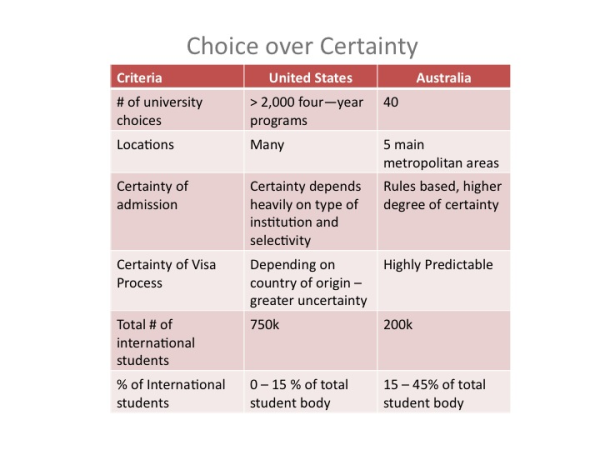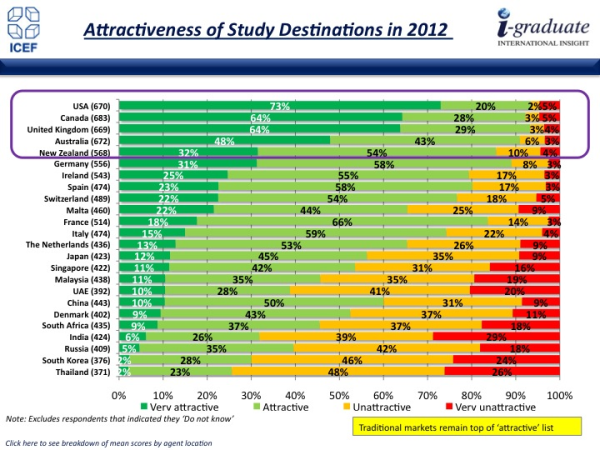As you interact with international students, your job is to present your academic programs the best way you can and identify the right students who will be a good academic, personal and financial fit for your institution.
Yet you are presenting, of course, in the context of a competitive field of many other universities and you need to be at least aware and knowledgeable of what the advantages and disadvantages of the other pitches.
We strongly believe in marketing segmentation, which is a fancy term for identifying the most important criteria of a prospective student and the likelihood that they would ultimately enroll in your school. Good admissions officers have a gut feeling whether a student would be a higher likelihood candidate and they want to invest more time and energy in nurturing this relationship.
So who are your competitors? It depends completely on what kind of program and school you are, where you are located and many other criteria.
You probably have a good sense for your U.S. competition. The range of schools considered by international students tends to be broader than for most U.S. students since they don’t typically have the same regional attachment which matters a great deal for American students.
What about your international competitors? The United States still comes out ahead in most international student surveys as the most desirable study destination. But as you know there is fierce competition from other English speaking countries such as Canada, Australia and the UK. Furthermore, non-English speaking markets in Europe and Asia are undertaking great efforts to attract international students. Universities in continental Europe offer thousands of English-language based academic programs. Singapore is working on becoming an education hub and Chinese universities are starting to attract large numbers of international students.
You have no control over those factors, but it makes it even more important to identify and agree on factors that constitute a suitable student. This will allow you to emphasize and market your differentiating hallmarks based on academics, support, location, internships, research or whatever else makes your institution suitable and attractive. Don’t forget you are one of the “attractions” as well. What I mean is that you are the human face of your institution. Prospective students and parents will think of you as much as the institution when considering their options.
Let’s look at a few of the defining competitive aspects between countries:
-
Geography
-
Application process
-
Visa entry
-
Post graduation visas
Here is a comparison of the attractiveness of various countries as measured by the ICEF-iGraduate barometer.
Geography:
So geography matters a great deal, and the desire to study in the United States is high. We need to emphasize the benefits of your location. But there are many other factors influencing the decision along the way including the application process, visa rules, expectations of being able to find work post-graduation and advice provided by agents and counselors along the way.
Application process:
The U.S. application process is more complex and uncertain than many other countries. We require not only standardized tests, but recommendations, essays, etc. I am not arguing whether this is good or bad at this point, but it is factually more demanding and complex. In many countries, academics is the only factor that matters. I have a certain appreciation for that situation since I grew up and studied in Germany where your GPA was the only entry requirement. I was baffled by the U.S. admissions requirements (but also motivated and got it done with some help and advice from American and Canadian friends). My high school teachers had never written university recommendations and college counselors did not exist in Germany.
What can we do? We need to explain and assist during the process as much as possible. Let’s simplify as much as possible but we understand that this is a big undertaking. If you read my colleague’s blog titled The Common App Challenges International Student Admissions, you'll see that we are not making it easier this year.
Visa Process:
The United States is one of the countries with a more challenging visa process. Sometimes, it seems like the State Department wants to be the “business prevention department." But the challenge is that our foreign service officers are under a lot of pressure to prevent the wrong people from entering the United States. Their career prospects are not improved by assisting international enrollment at American universities but their career will be harmed by admitting the wrong people. So the incentives are not aligned. I have good friends in the State Department and they obviously listen to horrendous storytelling about getting entry to the U.S. all day. It’s a challenging job. Nevertheless, our message to international students can be rather humiliating during the process. If you have ever lined up in front of a consulate in China or elsewhere, you are mistrusted by the guards of your own country and the guards by the U.S. You are certainly not treated as a customer who wants to literally spend hundreds of thousands of dollars in the United States. Can you imagine being treated this way by a company who wants you to buy their services?
What can we do? You can only explain the process, perhaps by providing videos and explanations. You can also assist with the appropriate documentation. If you are traveling and have the opportunity to visit an embassy to present your school, do so. But big consulates and embassies don't always have time and interest. Visa counselors also rotate regularly. We found that community colleges have some explaining to do since few State Department officials attended community colleges and they may not understand your value and path for international students.

Post Graduation Visas:
Our post graduation visa situation is similarly opaque and it all depends who you are, your major and above all your location. Companies are not very knowledgeable about OPT, and H-1B work visas are limited. All these factors introduce great uncertainty whether you will be able to gain post-graduation work experience in the United States. The situation in other countries is not dissimilar, though Canada and Australia have point systems and the path to work may be generally more transparent and slightly easier.
What can we do? Your university has no control over U.S. visa policies, but your career service can be helpful in helping identify internship opportunities and educating your regional employers on the simple process to hire students on OPT.


